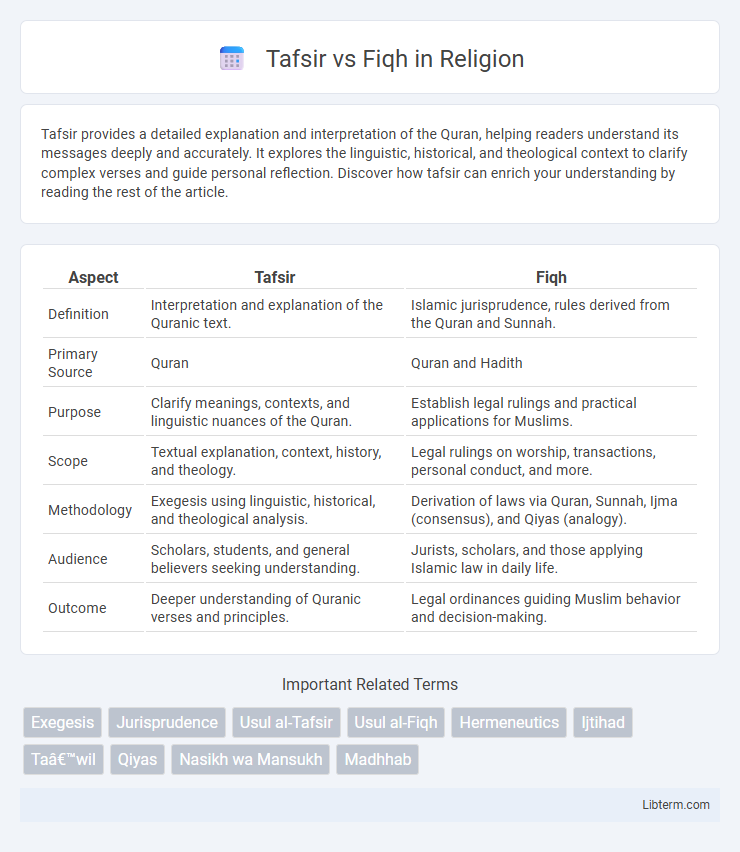Tafsir provides a detailed explanation and interpretation of the Quran, helping readers understand its messages deeply and accurately. It explores the linguistic, historical, and theological context to clarify complex verses and guide personal reflection. Discover how tafsir can enrich your understanding by reading the rest of the article.
Table of Comparison
| Aspect | Tafsir | Fiqh |
|---|---|---|
| Definition | Interpretation and explanation of the Quranic text. | Islamic jurisprudence, rules derived from the Quran and Sunnah. |
| Primary Source | Quran | Quran and Hadith |
| Purpose | Clarify meanings, contexts, and linguistic nuances of the Quran. | Establish legal rulings and practical applications for Muslims. |
| Scope | Textual explanation, context, history, and theology. | Legal rulings on worship, transactions, personal conduct, and more. |
| Methodology | Exegesis using linguistic, historical, and theological analysis. | Derivation of laws via Quran, Sunnah, Ijma (consensus), and Qiyas (analogy). |
| Audience | Scholars, students, and general believers seeking understanding. | Jurists, scholars, and those applying Islamic law in daily life. |
| Outcome | Deeper understanding of Quranic verses and principles. | Legal ordinances guiding Muslim behavior and decision-making. |
Introduction to Tafsir and Fiqh
Tafsir involves the detailed interpretation and explanation of the Quran, focusing on linguistic, contextual, and theological aspects to uncover its meanings. Fiqh represents Islamic jurisprudence derived from the Quran, Hadith, consensus (Ijma), and analogy (Qiyas), aimed at guiding practical legal rulings and daily conduct. Both fields are foundational in Islamic studies, with Tafsir providing the exegetical framework and Fiqh applying these insights to develop Sharia law.
Defining Tafsir: Meaning and Purpose
Tafsir refers to the exegesis or detailed interpretation of the Quran, aiming to clarify the meanings, context, and implications of the sacred text. Its purpose is to provide comprehensive understanding of Quranic verses by explaining linguistic, historical, and theological aspects. Unlike Fiqh, which focuses on Islamic jurisprudence and legal rulings, Tafsir centers on elucidating the divine message and guiding spiritual comprehension.
Defining Fiqh: Scope and Objectives
Fiqh, the Islamic jurisprudence, systematically derives legal rulings from foundational texts such as the Quran and Hadith, addressing acts of worship, transactions, and personal conduct. Its scope encompasses detailed laws governing rituals, civil dealings, criminal justice, and ethical guidelines to ensure compliance with Shariah. The primary objective of Fiqh is to provide precise, applicable guidance for daily life that aligns with divine principles and promotes social harmony.
Historical Development of Tafsir
The historical development of Tafsir traces back to the earliest Islamic period, where scholars began interpreting the Quranic text to explain its meanings and contexts. Prominent early figures such as Ibn Abbas and Mujahid contributed foundational exegeses that shaped classical Tafsir methods, integrating linguistic, theological, and legal insights. Over centuries, Tafsir evolved with major works like Tafsir al-Tabari and Tafsir al-Qurtubi, which established comprehensive methodologies distinguishing Tafsir's focus on scripture interpretation from Fiqh's focus on Islamic jurisprudence.
Historical Evolution of Fiqh
The historical evolution of Fiqh traces back to the early Islamic period, where juristic interpretations were derived from the Quran, Sunnah, consensus (Ijma), and analogical reasoning (Qiyas). Over centuries, distinct schools of thought such as Hanafi, Maliki, Shafi'i, and Hanbali emerged, each systematizing Islamic jurisprudence with unique legal methodologies. This evolution of Fiqh illustrates the dynamic development of Islamic law to address changing social, political, and cultural contexts beyond the foundational scriptural exegesis found in Tafsir.
Key Differences between Tafsir and Fiqh
Tafsir primarily involves the exegesis and interpretation of the Quranic text, aiming to explain its meanings, context, and linguistic nuances. Fiqh, on the other hand, centers on Islamic jurisprudence, focusing on deriving legal rulings and applications from the Quran and Sunnah. While Tafsir provides the foundational understanding of scripture, Fiqh translates that understanding into practical law guiding Muslim conduct and society.
Relationship between Tafsir and Fiqh
Tafsir and Fiqh are intrinsically connected, with Tafsir providing the contextual and linguistic interpretation of Quranic verses that serve as foundational evidence in Fiqh rulings. Accurate understanding of Tafsir is essential for deducing legal judgments in Islamic jurisprudence, as it clarifies the intent and application of Shariah principles. Scholars rely on Tafsir to resolve ambiguities in the Quran and ensure that Fiqh rulings align with the original divine guidance.
Methodologies Used in Tafsir vs Fiqh
Tafsir relies primarily on linguistic analysis, contextual understanding of Quranic verses, and prophetic traditions (Hadith) to interpret the meanings of the Quran. Fiqh methodology involves deductive reasoning from primary sources--the Quran and Sunnah--alongside consensus (Ijma) and analogical reasoning (Qiyas) to derive Islamic legal rulings. While Tafsir emphasizes exegesis and hermeneutics, Fiqh focuses on jurisprudential principles and practical application of Sharia law.
Prominent Scholars in Tafsir and Fiqh
Prominent scholars in Tafsir include Ibn Kathir, Al-Tabari, and Al-Qurtubi, renowned for their detailed exegesis of the Quran that combines linguistic analysis with contextual insights. In Fiqh, key figures like Imam Abu Hanifa, Imam Malik, Imam Shafi'i, and Imam Ahmad ibn Hanbal established foundational schools of Islamic jurisprudence by interpreting Sharia law through Hadith and Quranic injunctions. These scholars' works remain pivotal in shaping Islamic thought, where Tafsir provides the interpretive framework of sacred texts, and Fiqh translates those interpretations into practical legal rulings.
Importance of Understanding Both Fields
Understanding both Tafsir and Fiqh is essential for comprehending the Quranic text and its practical applications, as Tafsir provides the contextual and linguistic interpretation while Fiqh offers the legal rulings derived from these scriptures. Mastery of Tafsir ensures accurate grasp of divine guidance, whereas knowledge of Fiqh facilitates the implementation of Islamic law in daily life, making both fields indispensable for scholars and practitioners. Integrating insights from Tafsir and Fiqh promotes a holistic approach to Islamic teachings, enabling believers to align their actions with authentic religious principles.
Tafsir Infographic

 libterm.com
libterm.com